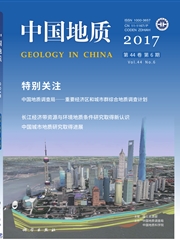

 中文摘要:
中文摘要:
利用盆地北部大量钻井资料、岩心及露头观察结果,结合古地质背景,以及粒度、岩矿等分析资料,对晚石炭一早二叠世广泛分布的含砾砂岩体沉积特征进行了深入的分析.结果表明:它们属于扇三角洲体系.并以河道化冲积的形式前积到陆表海盆地中,平面上分带性和纵向上退积结构较清楚,重力流沉积特征不明显,而水道化的牵引流成因沉积特征明显.以高能辫状水道、水下分流河道砂砾岩为主要骨架,河口坝不发育.而且,这些水道作用居重要地位的扇三角洲高能水道砂体因受物源、古地貌及潮汐等影响,往往被潮汐改造而形成障壁砂坝,也是有利储集体.它们之间因沉积特征不同,储集空间、储集性能和含油性也各具特色,但都以高能化水道形成的厚石英砂带为有利相带.
 英文摘要:
英文摘要:
Based on abundant well datas and core and outcrop observations, combined with geological setting as well as particle sizes and rock and mineral logging datas, the authors analyzed the sedimentary characteristics of widely distributed Late Carboniferous-Early Permian pebbly sandstones. It is suggested that they belong to the fan delta sedimentary system and were deposited in the epicontinental marine basin in the form of channel alluviation characterized by clear zonation in plane and obvious retrogradation structure in vertical section. The depositional structure was formed by the channel traction flow, with no obvious gravity flow deposition. The sandy conglomerate of high-energy braided channels and underwater distributary channels are their main skeletal bodies, whereas the river mouth bars are not well developed. Nevertheless, because of the effects of provenance, paleogeomorphic features and tide, the high-energy channel sand bodies of fan deltas with an important fluviation role have usually been reformed into barrier bars by tides, and hence they can also be regard as favorable reservoirs. Due to the difference in depositional characteristics, the reservoir space, reservoir property and oil-bearing properties of the fan delta are also evidently different. It is therefore concluded that the thick quartz sand belts formed by high energy channels seem to be the favorable fades belts.
 同期刊论文项目
同期刊论文项目
 同项目期刊论文
同项目期刊论文
 期刊信息
期刊信息
